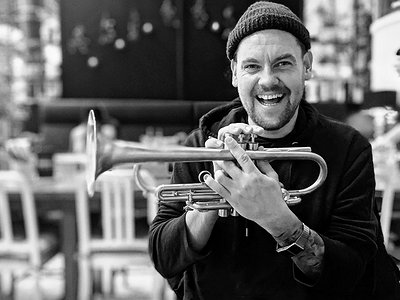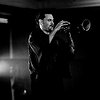Part 1
Name: Marius Gjersø
Nationality: Norwegian
Recent release: Marius Gjersø's Yûgen, featuring Kaja Fjellberg Pettersen, Sebastian Haugen, and Jo Berger Myhre, is out via NXN.
Recommendations: Arve Henriksen - Sakuteiki. I will never forget when I first heard this record. My views on music were forever changed.
Susanna and The Magical Orchestra - List of Lights and Buoys. I used to listen to this on repeat. Amazing breakdowns of classic songs with such emotions. How could I not?
[Read our Jo Berger Myhre interview]
If you enjoyed this interview with Marius Gjersø and would like to find out more about his music, visit his official website. He is also on Instagram, Facebook, and Soundcloud.
When did you start writing/producing/playing music and what or who were your early passions and influences? What was it about music and/or sound that drew you to it?
I started playing trumpet in a marching band when I was eight years old.
The plan was, however, never to become a musician at that point. I had somewhat of a talent, so I kept playing trumpet. Eventually I signed up for a music program in high school, where I met great friends that wanted to become musicians, and many of which I even work with today. They inspired me to keep playing and practicing, and from there it just kept rolling I guess.
This is also where I first fell in love with producing. I enjoyed it so much that I would sometimes skip other classes and instead go work in the studio at school. But unfortunately, coming out of high school, I couldn’t afford the equipment needed to keep producing on my own. So it was all put on hold for a few years.
I later studied jazz-trumpet at the Norwegian Academy of Music in Oslo. At that point I figured producing wasn’t for me anymore. I was probably too far behind my friends in terms of learning curve and skills, so instead I focused all my energy on playing the trumpet and forming my own personal sound.
I was really inspired by the mesmerizing acoustic sound, and almost whatever my favorite trumpeter Arve Henriksen was doing at that point. He had all these amazing soundscapes, looping sequences and enchanting music that truly spoke to me. His music wasn’t necessarily «jazz», but it was based on improvisation and was absolutely my kind of music.
At this point I had started recording a few things in Logic X, but I could never create anything similar to Henriksen and my other favorite artists. During these years I had also gotten into electronics and stomp boxes. But a few years later, after finishing my studies, I switched out the pedals and Logic for Ableton Live. And I guess that’s when everything really clicked. I had tried several times to team up with producers to make my first solo-album or at least a few tracks, but it never felt right, and the end result just wasn’t there. But through Ableton a whole new world seemed to open up, and I suddenly realized I could do it all myself.
Obviously there was, and still is, a lot to learn. But there was something about that playfulness, ease and endless possibilities in Ableton that suddenly made producing fun and less daunting to me.
When I listen to music, I see shapes, objects and colors. What happens in your body when you're listening and how does it influence your approach to creativity?
For me it’s more of a feeling, a mood or a vibe. In general I have an unfortunate tendency to over analyze and deconstruct music. So for me the absolute best moments in music are when I'm able to just relax, listen and enjoy, without thinking too much.
And I guess that’s also how I make music, or at least try to. I search for those emotions or atmospheres more than I plan ahead. My record Yûgen was made by a ton of samples, where I added tiny bits of sound here and there to form whatever the soundscape, chords and songs were going to end up as.
I do often have some sort of idea of where I want to end up, but rarely exactly how I’m gonna get there. The song is finished when I feel like I’ve (hopefully) created a small pocket of time and space.
How would you describe your development as an artist in terms of interests and challenges, searching for a personal voice, as well as breakthroughs?
As a trumpeter I’ve had to do a lot of different gigs through the years, to be able to live off of music. I’ve gone through several different stages, but the search for a personal voice has been my main thing for as long as I can remember.
I actually started off playing classical trumpet, before I even knew there was a genre called jazz. That clearly wasn’t for me ;) I started improvising when I was about 15/16 years old, kinda late. I began listening to groovy jazz and funk. However I´ve never been flashy or a technically gifted trumpeter, so my focus was always about sound and expression. When I discovered the late, great Chet Baker, I found that in addition to his brilliant lines, his sound was a big part of his musicianship. That resonated with me and I learnt a lot from listening to him.
However, even though I studied jazz, I never considered myself a jazz musician. And so I became more and more interested in free improvisation and open sonic spaces. Both acoustic and electronic.
Ever since I first stumbled upon this "nordic approach" to jazz, I've gravitated towards that sound. Norwegian musicians like Jan Bang, Ståle Storløkken, Arve Henriksen, Eivind Aarset, but also a legend like Jon Hassel really speak to me, and are still to this day a major inspiration.
[Read our Ståle Storløkken interview]
[Read our Eivind Aarset interview]
Then, once I first went to Tokyo, Japan, I was truly mesmerized. Both by the music, but also the people, their traditions and the general feel and mystique of Japan. And for at least a decade, I've been wanting and searching for a way to combine these aesthetics and vibes within my own music.
So I guess my first breakthroughs were whenever I felt like I was able to implement my own personal sound and musical preference into bands, projects, records and concerts, without compromising myself to suit something or someone else. Even though obviously my focus and preferences have evolved with the years as well. But being true to myself has always been my main inspiration.
I also have to highlight the switch to Ableton and how that has opened up a whole new world of possibilities to me. Both in terms of adding to and developing my personal sound, and unlocking my potential as a producer. And also I've learnt how to add Live visuals to my concerts, to cater to more senses and make the experience feel more as a whole.
The second breakthrough though has got to be to finally have made my own debut album Yûgen. I can't wait for where it might lead me in the future.
Tell me a bit about your sense of identity and how it influences both your preferences as a listener and your creativity as an artist, please.
I guess, just like many others, I have many sides to my personality. I'm usually known as being a quite bubbly, social and extrovert person.
But as a musician or an artist, on stage, there's clearly something deeper inside that drives me. I have all these emotions that I wish to communicate. I try to be more in the moment and less self aware. I think that maybe my music reflects and unlocks a different side of me that you don't often get to see on the surface.
What, would you say, are the key ideas behind your approach to music and art?
Again, it's based on emotions more than anything else. I want my music to be pretty, energetic, warm, dark, full, rich, interesting and beautiful. So easy and yet so difficult at the same time.
I think we all experience music and art based on our own frame of mind. The experience will never be completely the same to different people, and I find that really intriguing. But my ultimate goal in music is, as I said previously, to be able to create a pocket of time and space.
How would you describe your views on topics like originality and innovation versus perfection and timelessness in music? Are you interested in a “music of the future” or “continuing a tradition”?
Good question. I try not to be too conscious of either actually.
In many ways I think music is like fashion. There are cycles of 20 or 30 years where the same styles reappear, but often with a slight twist that makes it modern or contemporary. Innovation is often a new combination of earlier pieces, put together in a different way. And of course technological advancements plays its part. Is it originality or is it continuing a tradition?
In my own music, I try to stay true to my inner voice and make music that's inspiring to me at that time. However my inspiration definitely comes from somewhere. In that sense I guess I'm continuing a tradition, but maybe not intentionally.
At the same time I would of course hope that my music has the quality of longevity and the possibility to age well, regardless of where the future lies.
Over the course of your development, what have been your most important instruments and tools - and what are the most promising strategies for working with them?
Obviously I play the trumpet. And the possibilities, but also the limits of the horn have influenced me a lot in forming my personal sound. It can be really frustrating, but I'm really glad I spent time developing that first. But then, once I started producing in Ableton Live, I feel like I finally came more to my own as a complete artist. I'm finally able to create whole soundscapes and universes of my own imagination.
I've also started playing solo concerts the last few years, which has always seemed daunting and an impossible feat. And that would absolutely not have happened without the endless possibilities within this program.
In terms of strategies, I try to keep things fresh. By that I mean that I attempt to improvise and find different ways of creating and developing sounds as a starting point. Once I have a texture or something that interests me, I might revert to my more "standard" ways of producing. But then my mindset and what the track needs might be different than the last time, and therefore more interesting.






